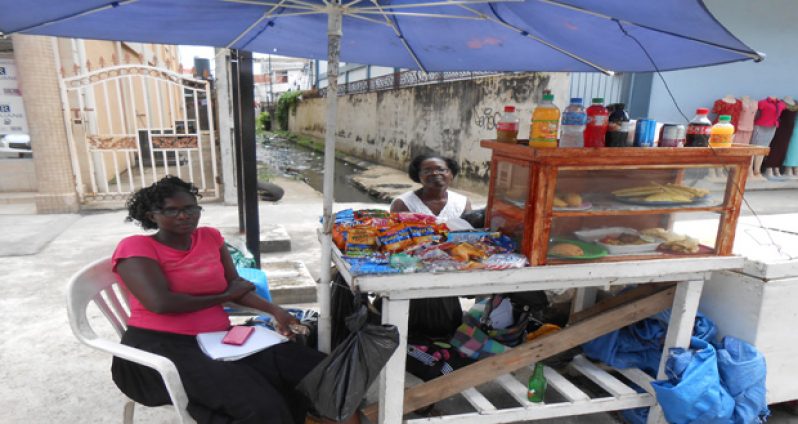TREKKING through dangerous jungle paths, or walking desolate trails and travelling for hours and hours sounds like the life of a hard-working bushman or pork-knocker who traverses the interior in search of that valuable but often elusive mineral. Well, think again; this is just a snippet from the life and experiences of a simple but remarkable woman.
Robin Ridley is forty-five years old and is a mother of seven. She grew up in the Bartica/Mazaruni area. This resourceful owner of a small street-side business is proud to be independent. “I am always working; never out of a job. I am either working for someone or working for myself. I am fiercely independent,” Robin says.
This hardworking woman is an excellent cook, and plies her trade on Wellington Street in Georgetown. She is always cheerful and generous. During the course of my short interview with her, she gave freely to two people in need. Her customers are treated like family.
Robin loves music, and does a lot of reading whenever she gets the chance. “Even though I love music, I never party. My favourite dish is Fried Rice and Baked Chicken. I have worked as cleaner, cook and security. No honest job is below me.”
She fondly recalls her years growing up in the interior, before moving to the city at age nineteen. “Back then, I lived at 72 Miles Potaro. That area has one of the longest wooden bridges in Guyana. My mother taught me to make cassava bread, starch, tuma pot and cassareep. I also learned how to make bashwar and casserie with red potato.”
She remembers fishing with ’IRI’, a plant that you can crush or pound the stem then place in the water. “The fish are immediately intoxicated, and fishing is made easy. You have to move quickly because the effects of ‘IRI’ do not last very long.”
The fish is then used to make all sorts of dishes, including the delicious tuma pot.
Robin says one of the sweetest dishes she has ever cooked is awara or kuru cook-up rice. Caution has to be taken when using kuru, because it is a very oily fruit and can result in oily cook-up rice and plenty ‘runnings’ later on.
“I remember walking for many miles in the bush. I walked from home to Amatuk then to Waratuk and on to Tukeit. One time I climbed to the top of Kaieteur Mountain. Back then it felt like nothing. Don’t think I would attempt that today.”
Ripe pear and cassava bread was another of her favourite meals. She explained that when she lived in the interior, it was far less expensive than when she moved to Georgetown. Bush life was challenging, and was often filled with tension and thrills.
“Me and my sister would walk 17 miles and pass Tumatumari to sell. We would make crab oil and walk that long distance to do business. I was fourteen or fifteen at that time. If we noticed anyone approaching on the trail, we would hide in the bush until they were gone. We did this because most of the people on the trail were men, so we learned to be cautious”.
Robin has done some work in a mining camp as a cook, aka bhaihir. She found that job to be very tough, but the experience was good.
“I had to cook for 15 hungry men. They ate in bowls, not plates. When you saw the bowls you had to fill, you knew right away that it would not be easy. I woke up at 4am every morning. The work after then was virtually non-stop. First it was preparation for breakfast, then cook breakfast. This could range from float and saltfish to roti and curry. Whenever I made roti, I had a strict rule: One and back-off, two and knock-off. Most of them settled for one.
“After breakfast it was time for the real work — lunch. Lunch was the biggest meal of the day, and the heaviest work.
“Preparation was just as hard as cooking, and sometimes harder if you were preparing provisions. After filling the bowls, I would relax for a short while, then begin making snacks. When this was completed, I would start preparation for dinner. The same process applied. When it was you alone in the kitchen it turned out to be quite tiring. As a result I would be sound asleep at 6 p.m. In the bush, six in the evening was as black as pitch.
“I have never encountered a snake while there, because our camp had a serious rule: NO FOOD IS DISPOSED NEAR THE CAMP.”
By Neil Primus


.jpg)











